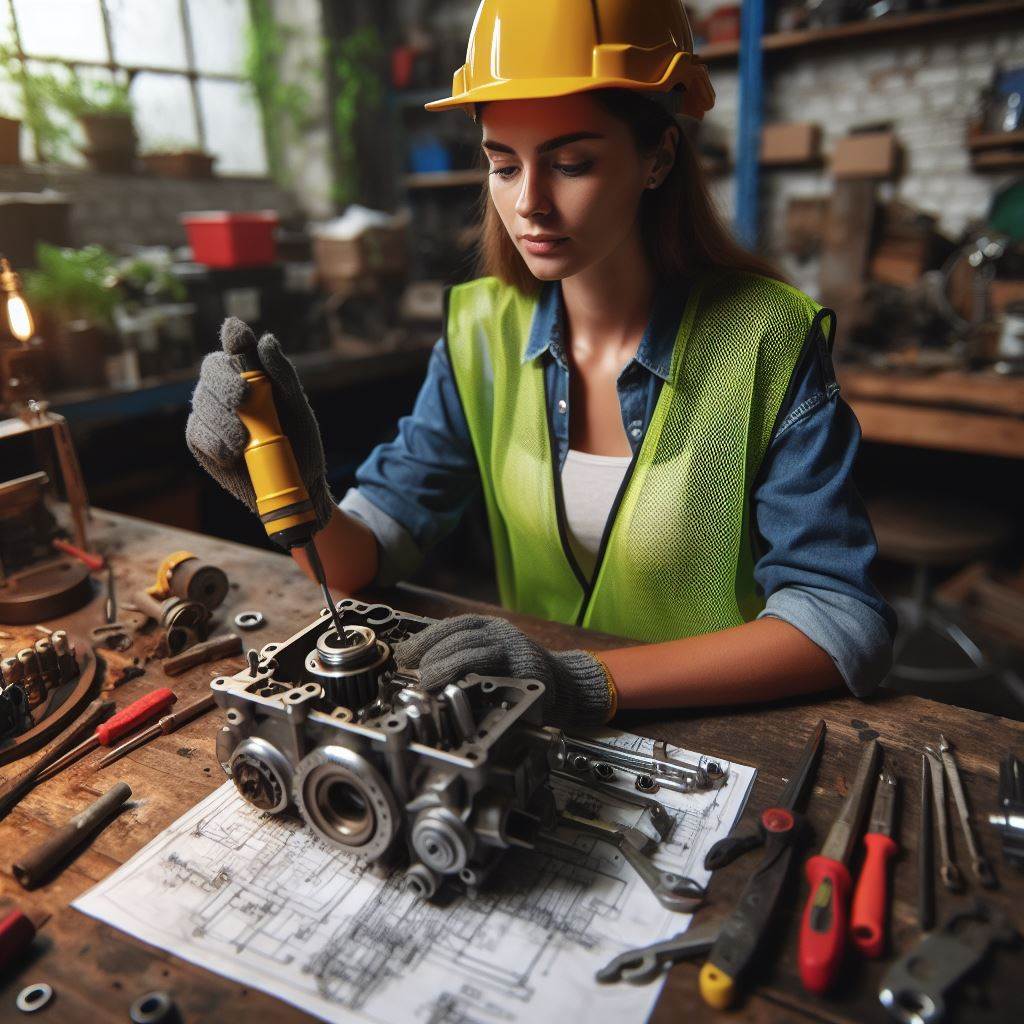Introduction
Embarking on a journey into the realm of mechanical engineering, it is imperative to acknowledge the historical context surrounding women’s involvement in this field.
Traditionally, mechanical engineering has been perceived as a male-dominated domain, but the landscape is evolving.
The purpose of this blog post is to illuminate and celebrate the remarkable contributions of Australian women in mechanical engineering.
Through insightful narratives and inspiring anecdotes, we aim to showcase the resilience, innovation, and expertise these women bring to the field.
By sharing their stories, we hope to break down stereotypes, inspire future generations, and foster a more inclusive and diverse landscape within the mechanical engineering community in Australia.
Sally Thompson
Sally Thompson, a highly successful mechanical engineer in Australia, has made significant contributions to the field.
With a strong educational background, Sally graduated with a Bachelor of Mechanical Engineering from a prestigious university.
During her early career, Sally gained invaluable experience working as an intern for a leading engineering company.
She quickly proved her capabilities and was promoted to a full-time engineer, contributing to various projects.
One of her notable accomplishments was designing a more efficient cooling system for a large industrial plant.
Sally’s innovative solution not only reduced energy consumption but also saved the company thousands of dollars annually.
Despite her success, Sally faced personal challenges, including being the only woman in her engineering class.
She overcame these obstacles by staying focused on her goals and seeking support from like-minded individuals.
Currently, Sally holds a senior leadership role in a renowned engineering firm, overseeing multiple projects.
She continues to inspire young women to pursue careers in mechanical engineering through mentoring and speaking engagements.
Sally’s story serves as a reminder that with determination and perseverance, anyone can succeed in a male-dominated field.
Read: A Day in the Life of an Aussie Plumber
Emily Davis
Meet Emily Davis, a distinguished figure in the realm of mechanical engineering, whose journey is as inspiring as her accomplishments.
Emily’s academic path was marked by determination and passion for innovation.
Graduating with honors in mechanical engineering, she was driven by a fascination with the intersection of technology and creativity.
Entering a traditionally male-dominated industry, Emily faced challenges but embraced them as opportunities for growth.
Her experiences as a female mechanical engineer provided her with unique perspectives and insights, contributing to her ability to approach problems from diverse angles.
Notable projects and awards have adorned Emily’s career, showcasing her prowess in the field.
From spearheading groundbreaking initiatives to receiving recognition for her outstanding contributions, she has consistently pushed the boundaries of what is achievable in mechanical engineering.
What sets Emily apart is not just her technical proficiency but also her commitment to fostering inclusivity and diversity within the industry.
Through mentorship programs and advocacy for women in STEM, she has actively worked towards dismantling barriers and creating a more equitable work environment.
Emily’s story is not just one of personal success; it’s a testament to the transformative power of perseverance and dedication in the face of challenges.
Her ability to thrive in a male-dominated industry serves as an inspiration to aspiring female engineers, demonstrating that excellence knows no gender.
Emily Davis is not just a mechanical engineer; she is a trailblazer, making a lasting impact on the field and paving the way for future generations.
Read: How to Become a Plumber in Australia
Your Personalized Career Strategy
Unlock your potential with tailored career consulting. Get clear, actionable steps designed for your success. Start now!
Get StartedRachel Patel
Rachel Patel is a highly successful woman in the field of mechanical engineering in Australia.
Having completed her undergraduate degree in mechanical engineering, Rachel went on to pursue a master’s degree in the same field.
During her early career, Rachel faced unique challenges as a woman in a male-dominated industry.
Despite these challenges, Rachel persevered and was able to contribute significantly to the field of mechanical engineering.
Her groundbreaking research in energy-efficient machinery earned her several accolades and recognition.
Moreover, Rachel’s design innovations in renewable energy systems have revolutionized the industry.
Currently, Rachel holds a leadership position within a prominent engineering firm and continues to make notable accomplishments.
She has successfully led various large-scale projects, including the design and implementation of sustainable infrastructure.
Rachel’s dedication to promoting gender diversity in engineering has also made a significant impact.
Through mentorship programs and industry initiatives, she has inspired and empowered numerous aspiring female engineers.
Additionally, Rachel actively participates in conferences and seminars, sharing her expertise and knowledge with fellow professionals.
Her contributions to the field of mechanical engineering have not only paved the way for future generations of women but also enhanced the industry as a whole.
Rachel’s story exemplifies the immense potential and capability of women in the field of mechanical engineering.
Her accomplishments serve as an inspiration to aspiring female engineers, reminding them that gender should never limit their ambitions.
Stand Out with a Resume That Gets Results
Your career is worth more than a generic template. Let us craft a resume and cover letter that showcase your unique strengths and help you secure that dream job.
Get HiredThrough determination, hard work, and a passion for their chosen field, women like Rachel Patel can thrive and achieve great success in engineering.
As society continues to evolve and recognize the importance of gender diversity, more women will undoubtedly follow in Rachel’s footsteps, contributing to the advancement of mechanical engineering in Australia and beyond.
Read: The Future of Plumbing Tech in Australia

Common Themes and Challenges
Identifying Common Challenges Faced by Women in Mechanical Engineering
- Limited representation and a male-dominated environment in mechanical engineering workplaces.
- Prevalence of stereotypes and biases that discourage women from pursuing or persisting in this field.
- Lack of support and mentorship opportunities specifically tailored for women in mechanical engineering.
- Unequal access to resources, opportunities, and career advancement compared to male counterparts.
The Importance of Diversity and Gender Equality in this Field
- Diversity in perspectives and experiences leads to better problem-solving and innovation in engineering.
- Gender equality promotes fairness and inclusivity, fostering a positive and supportive work environment.
- Encouraging women in mechanical engineering ensures better representation and a more balanced workforce.
- Diverse teams improve product design by considering a wider range of users’ needs and preferences.
Efforts Being Made to Encourage More Women to Pursue Careers in Mechanical Engineering
- Educational initiatives and programs aimed at attracting and retaining women in mechanical engineering.
- Scholarships, grants, and funding opportunities specifically targeting female students in this field.
- Industry partnerships and mentorship programs that provide support and guidance to aspiring female engineers.
- Creation of safe spaces and networking events to connect women in mechanical engineering and foster community.
Relevant Statistics and Data Showcasing the Current Representation of Women in this Industry
- According to Engineers Australia, only 13% of professional engineers in Australia are women.
- The number of women pursuing undergraduate degrees in mechanical engineering remains significantly low.
- A study by the Australian Bureau of Statistics shows women make up only 10% of the engineering workforce.
- The gender pay gap in engineering averages around 20%, indicating unequal opportunities for women.
In essence, women in mechanical engineering face various challenges due to limited representation, stereotypes, and unequal access to resources.
However, it is crucial to promote diversity and gender equality in this field for the betterment of engineering outcomes and a more inclusive work environment.
Efforts are being made to encourage more women to pursue careers in mechanical engineering through educational initiatives, funding opportunities, and mentorship programs.
Nevertheless, the current representation of women in this industry is still significantly low, highlighting the need for continued support and advocacy for gender equality.
Read: Top Plumbing Trends in Australian Engineering
Discover More: Carpentry Safety Tips for Australian Pros
Conclusion
In closing, the blog post has shared inspiring stories of different women in mechanical engineering.
These stories highlight their achievements, perseverance, and passion for the field.
It is clear that these women have made significant contributions to the industry and have shattered gender stereotypes.
However, it is also evident that there is a need for more representation and opportunities for women in mechanical engineering.
The stories showcased the challenges faced by women in a male-dominated field, but also their determination to succeed.
Therefore, it is important to encourage more women to consider a career in mechanical engineering.
By following in the footsteps of these successful women, future generations can continue to break barriers and contribute to the field’s growth and innovation.
For those interested in pursuing a career in mechanical engineering, there are several resources and organizations available to support women in this field.
These include mentorship programs, networking opportunities, and scholarships specifically tailored for women in engineering.
These resources can provide guidance, support, and inspiration throughout their professional journey.
In the end, the stories shared in this blog post should serve as a beacon of hope for aspiring women engineers.
With more representation and opportunities, we can create an inclusive industry that benefits from the diverse perspectives and talents of women in mechanical engineering.




